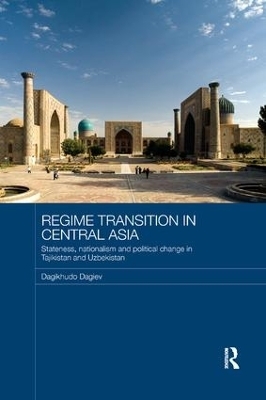
Regime Transition in Central Asia
Routledge (Verlag)
978-1-138-57867-8 (ISBN)
The book analyses how in the early stages of their independence, the governments of Central Asia declared that they would build democratic states, but that in practice, they demonstrated that they are more inclined towards authoritarianism. With the declaration of independence, Tajikistan and Uzbekistan, like many other former Soviet national republics, were faced with the issues of nationalism, ethnicity, identity and territorial delimitation. This book looks at how the discourse of patrimonial nationalism in post-Communist Tajikistan and Uzbekistan has been the elites’ strategy to address all these issues: to maintain the stateness of their respective countries; to preserve the unity of their nation; to fill the ideological void of post-Communism; to prevent the rise of Islam; and to legitimize their authoritarian practice.
Arguing against the claim that the Central Asian states have undergone divergent paths of transition, the book discusses how they are in fact all authoritarian, although exhibiting different degrees of authoritarianism. This book provides a useful contribution to studies on Central Asian Politics and International Relations.
Dagikhudo Dagiev is a Research Associate in the Department of Academic Research and Publications at the Institute of Ismaili Studies, UK. His research areas include contemporary societies in post-Communist Central Asia, their history and religion, the re-emergence of Islam as a faith, the appearance of Islamist ideologies, and nationalism.
1. An Introduction to Political Transition in post-Soviet Central Asia 2. National Territorial Delimitation in Soviet Central Asia 3. Nationalism in Soviet and Post-Soviet Central Asia 4. Patrimonial Nationalism: A Transitional Phenomenon 5. Tajik Nationalism and the Civil War 6. ‘Patrimonial Nationalism’ in Tajikistan and Uzbekistan 7. The Use of Symbols and Islam in Identity Forging 8. The Multi-Party System and Purge of Political Opponents 9. Conclusion
| Erscheinungsdatum | 21.10.2017 |
|---|---|
| Reihe/Serie | Routledge Advances in Central Asian Studies |
| Zusatzinfo | 5 Tables, black and white; 1 Line drawings, black and white; 2 Halftones, black and white; 3 Illustrations, black and white |
| Verlagsort | London |
| Sprache | englisch |
| Maße | 156 x 234 mm |
| Gewicht | 453 g |
| Themenwelt | Geschichte ► Teilgebiete der Geschichte ► Kulturgeschichte |
| Geisteswissenschaften ► Philosophie | |
| Naturwissenschaften ► Geowissenschaften ► Geografie / Kartografie | |
| Sozialwissenschaften ► Ethnologie | |
| Sozialwissenschaften ► Politik / Verwaltung ► Europäische / Internationale Politik | |
| Sozialwissenschaften ► Politik / Verwaltung ► Politische Systeme | |
| Sozialwissenschaften ► Politik / Verwaltung ► Politische Theorie | |
| Sozialwissenschaften ► Soziologie ► Spezielle Soziologien | |
| ISBN-10 | 1-138-57867-3 / 1138578673 |
| ISBN-13 | 978-1-138-57867-8 / 9781138578678 |
| Zustand | Neuware |
| Haben Sie eine Frage zum Produkt? |
aus dem Bereich


